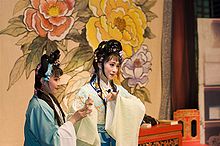
Teochew cuisine, also known as Chiuchow cuisine, Chaozhou cuisine or Chaoshan cuisine, originated from the Chaoshan region in the eastern part of China's Guangdong Province, which includes the cities of Chaozhou, Shantou and Jieyang. Teochew cuisine bears more similarities to that of Fujian cuisine, particularly Southern Min cuisine, due to the similarity of Chaoshan's and Fujian's culture, language, and their geographic proximity to each other. However, Teochew cuisine is also influenced by Cantonese cuisine in its style and technique.

Hong Kong, officially the Hong Kong Special Administrative Region of the People's Republic of China, is a special administrative region on the eastern side of the Pearl River estuary in southern China. With over 7.4 million people of various nationalities in a 1,104-square-kilometre (426 sq mi) territory, Hong Kong is one of the most densely populated places in the world.

Chaozhou, alternatively transliterated as Chiuchow, Chaochow or Teochew, is a city in the eastern Guangdong province of China. It borders Shantou to the south, Jieyang to the southwest, Meizhou to the northwest, the province of Fujian to the east and the South China Sea to the southeast. It is administered as a prefecture-level city with a jurisdiction area of 3,110 square kilometres (1,200 sq mi) and a total population of 2,669,844. Along with Shantou and Jieyang, Chaozhou is part of the Chaoshan region.

Kowloon City is an area in Kowloon, Hong Kong. It is administratively part of Kowloon City District.

The culture of Hong Kong, or Hongkongers culture, can best be described as a foundation that began with Lingnan's Cantonese culture and, to a much lesser extent, non-Cantonese branches of Han Chinese cultures. It later became influenced by British culture due to British colonialism, resulting in a culture characterised by both Cantonese-ness and British-ness. Moreover, Hong Kong also has indigenous people, whose cultures have been absorbed into modern day Hong Kong culture. As a result, after the 1997 transfer of sovereignty to the People's Republic of China, Hong Kong has continued to develop an identity of its own.

The cinema of Hong Kong is one of the three major threads in the history of Chinese language cinema, alongside the cinema of China, and the cinema of Taiwan. As a former British colony, Hong Kong had a greater degree of political and economic freedom than mainland China and Taiwan, and developed into a filmmaking hub for the Chinese-speaking world.

Cantonese opera is one of the major categories in Chinese opera, originating in southern China's Guangdong Province. It is popular in Guangdong, Guangxi, Hong Kong, Macau and among Chinese communities in Southeast Asia. Like all versions of Chinese opera, it is a traditional Chinese art form, involving music, singing, martial arts, acrobatics, and acting.

Kunqu, also known as Kunju (崑劇), Kun opera or Kunqu Opera, is one of the oldest extant forms of Chinese opera. It evolved from the Kunshan melody, and dominated Chinese theatre from the 16th to the 18th centuries. The style originated in the Wu cultural area. It has been listed as one of the Masterpieces of the Oral and Intangible Heritage of Humanity by UNESCO since 2001.

The Hong Kong Academy for Performing Arts is a provider of tertiary education in Hong Kong. Located near the north coast of Wan Chai on Hong Kong Island, the main campus also functions as a venue for performances. Apart from the main campus in Wanchai, Bethanie, the site of the institution's Landmark Heritage Campus in Pokfulam, has housed the School of Film and Television since 2007.
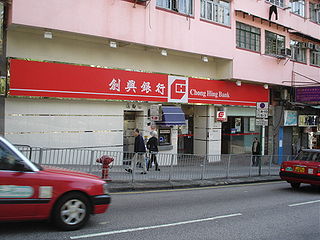
Chong Hing Bank is a bank founded in Hong Kong in 1948. It is headquartered in Central, while the back offices are located in Western District and Mongkok. It was owned by the Liu family of Hong Kong until it was acquired by the Chinese state-owned Yue Xiu Group in 2014.

The Music of Hong Kong is an eclectic mixture of traditional and popular genres. Cantopop is one of the more prominent genres of music produced in Hong Kong. The Hong Kong Philharmonic Orchestra and the Hong Kong Sinfonietta regularly perform western classical music in the city. There is also a long tradition of Cantonese opera within Hong Kong.
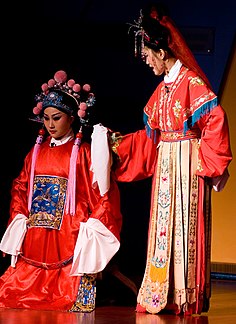
Huangmei or Huangmei tone originated as a form of rural folksong and dance that has been in existence for the last 200 years and possibly longer. Huangmei opera is one of the most famous and mainstream opera in China. The original Huangmei opera was sung by women when they were picking tea, and the opera was called the Picking Tea Song. In the late Qing dynasty, the songs came into Anhui Province— Huaining County adjacent regions, combined with the local folk art, Anqing dialect with singing and chants, and gradually developed into a newborn's operas. The music is performed with a pitch that hits high and stays high for the duration of the song. It is unique in the sense that it does not sound like the typical rhythmic Chinese opera. In the 1960s Hong Kong counted the style as much as an opera as it was a music genre. Today it is more of a traditional performance art with efforts of revival in mainland China, Hong Kong, and Taiwan, and mostly sung in Mandarin.
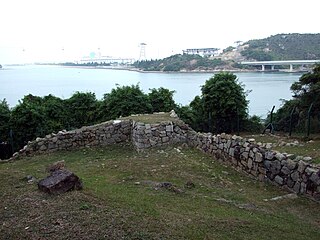
Tung Chung Battery is a former artillery battery located on Lantau Island in Hong Kong. Named after the eponymous district it is situated in, it was built in 1817, twenty-four years before the British took possession of Hong Kong. It was rediscovered in 1980 and is a declared monument of Hong Kong.
Kung fu film is a subgenre of martial arts films and Hong Kong action cinema set in the contemporary period and featuring realistic martial arts. It lacks the fantasy elements seen in wuxia, a related martial arts genre that uses historical settings based on ancient China. Swordplay is also less common in kung-fu films than in wuxia and fighting is done through unarmed combat.

Don't Fool Me is a 1991 Hong Kong action comedy film directed by Herman Yau starring Andy Lau, Tony Leung, Teresa Mo and Fennie Yuen.

The Hong Kong Arts Festival (香港藝術節) (HKAF), founded in 1973, is an annual series of cultural programmes in Hong Kong, with many performances from other parts of the world.
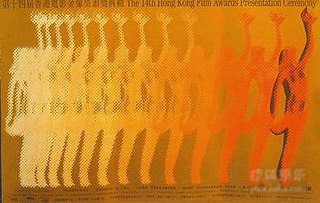
The 14th Hong Kong Awards ceremony, honored the best films of 1994 and took place on 23 April 1995 at Hong Kong Academy for Performing Arts, Wan Chai, Hong Kong. The ceremony was hosted by John Sham and Meg Lam, during the ceremony awards are presented in 17 categories.

Aberdeen is an area and town on southwest Hong Kong Island in Hong Kong. Administratively, it is part of the Southern District. While the name "Aberdeen" could be taken in a broad sense to encompass the areas of Aberdeen (town), Wong Chuk Hang, Ap Lei Chau, Tin Wan, Wah Kwai Estate and Wah Fu Estate, it is more often used to refer to the town only. According to the population census conducted in 2011, the total population of the Aberdeen area is approximately 80,000.
The 2012–13 Hong Kong First Division League, also known as 2012–13 Red MR Hong Kong First Division League for sponsorship reasons, was the 101st since its establishment.
Teochew or Chiuchow is an area in eastern Guangdong, China which contains Chaozhou, Shantou (Swatow) and Jieyang (Kityang) cities under new administrative division of PRC government made to former Teochew prefecture established in Qing dynasty.
